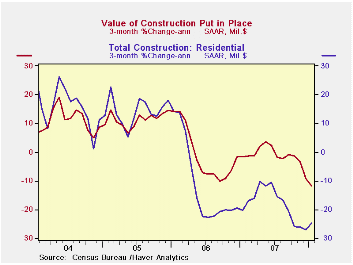 Global| Mar 03 2008
Global| Mar 03 2008U.S. Construction Spending Fell. All Categories Down
by:Tom Moeller
|in:Economy in Brief
Summary
The value of construction put in place fell 1.7% during January, roughly repeating its little revised 1.3% December downdraft. The latest decline was the forth consecutive monthly drop but the last two were by far the largest of the [...]

The value of construction put in place fell 1.7% during January, roughly repeating its little revised 1.3% December downdraft. The latest decline was the forth consecutive monthly drop but the last two were by far the largest of the bunch. Activity during the opening month of 2008 was 1.7% below the 4Q07 average. A 0.7% decline had been generally expected in January construction activity.
For the first month since late 2006, the value of nonresidential building activity fell. Building in the lodging area fell 3.0% (+55.1 y/y) and roughly repeated its downwardly revised 2.7% December decline. Office construction rose a modest 0.7% (7.1% y/y) but a previously reported large December gain was revised away. Multi-unit retail (shopping malls) fell 2.3% (+1.6% y/y).
Growth in the nonresidential area continued with a 2.1% (21.8% y/y) rise in education. Spending in the factory sector ticked up 0.1% (31.7 y/y) after little revised, very strong gains during the prior four months. Spending in the transportation area fell 0.8% (+15.2% y/y) and spending in the health care industry fell 1.0% (+4.8% y/y).
Private construction in total fell another 2.2%, pulled down further by a 3.0% drop in residential building, the largest since last October. Construction activity on new single family units tumbled 5.2% (-32.1% y/y), about the rate of decline as during the prior five months. Building activity on multi-family units also fell a sharp 1.7% (-18.6% y/y) while spending on improvements ticked down 0.2% (+5.2% y/y).
Housing and the "R" Word from the Federal Reserve Bank of St. Louis can be found here .
During the last twenty years there has been an 84% correlation between the q/q change in the value of residential building and its contribution to growth in real GDP.
Public construction spending fell slightly, by 0.2%. Construction on highways & streets fell 1.3% (+0.9% y/y) for the third consecutive monthly decline. The value of construction on highways & streets is nearly one third of the value of total public construction spending.
These more detailed categories represent the Census Bureau’s reclassification of construction activity into end-use groups. Finer detail is available for many of the categories; for instance, commercial construction is shown for Automotive sales and parking facilities, drugstores, building supply stores, and both commercial warehouses and mini-storage facilities. Note that start dates vary for some seasonally adjusted line items in 2000 and 2002 and that constant-dollar data are no longer computed.
| Construction | January | December | Y/Y | 2007 | 2006 | 2005 |
|---|---|---|---|---|---|---|
| Total | -1.7% | -1.3% | -3.3% | -2.7% | 5.6% | 10.7% |
| Private | -2.2% | -1.3% | -6.4% | -6.8% | 4.7% | 12.0% |
| Residential | -3.0% | -2.6% | -19.7% | -18.1% | 0.5% | 13.7% |
| Nonresidential | -1.2% | 0.4% | 17.3% | 18.0% | 15.2% | 7.8% |
| Public | -0.2% | -1.6% | 6.6% | 12.3% | 9.2% | 6.2% |
Tom Moeller
AuthorMore in Author Profile »Prior to joining Haver Analytics in 2000, Mr. Moeller worked as the Economist at Chancellor Capital Management from 1985 to 1999. There, he developed comprehensive economic forecasts and interpreted economic data for equity and fixed income portfolio managers. Also at Chancellor, Mr. Moeller worked as an equity analyst and was responsible for researching and rating companies in the economically sensitive automobile and housing industries for investment in Chancellor’s equity portfolio. Prior to joining Chancellor, Mr. Moeller was an Economist at Citibank from 1979 to 1984. He also analyzed pricing behavior in the metals industry for the Council on Wage and Price Stability in Washington, D.C. In 1999, Mr. Moeller received the award for most accurate forecast from the Forecasters' Club of New York. From 1990 to 1992 he was President of the New York Association for Business Economists. Mr. Moeller earned an M.B.A. in Finance from Fordham University, where he graduated in 1987. He holds a Bachelor of Arts in Economics from George Washington University.
More Economy in Brief
 Global| Feb 05 2026
Global| Feb 05 2026Charts of the Week: Balanced Policy, Resilient Data and AI Narratives
by:Andrew Cates






